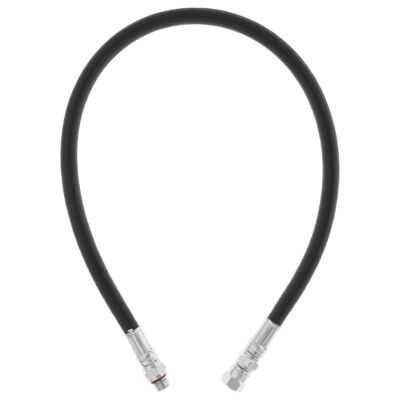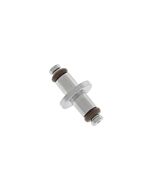High Pressure Double Braided Flex Kevlar Hose
- Double-braiding resists snags and abrasions
- Kink resistant Kevlar layer - chromed brass fittings
- More flexible - 1/3 lighter - UV resistant
- 7/16-inch male to 1st stage - 7/16-inch female to SPG
- All hoses are Nitrox Ready
High Pressure Double Braided Flex Kevlar Hose
DGX brand very SHORT 6-inch and 9-inch HP hoses are listed as a separate product.
Although the Kevlar makes them not as flexible as low pressure double braided hoses, they are still more flexible than ordinary rubber HP hoses. This hose has a typical outside diameter that works better with hose boots and consoles. All these high pressure flex SCUBA hoses have chromed brass fittings, are designed to conform to the EN 250:2014 standard, and are Nitrox Ready.
The typical HP hose is a 7/16-inch male at the end that screws into the first stage HP port and a 7/16-inch female swivel at the end that screws on to the SPG. Our most popular HP hoses are {24 in | 61 cm} long for doubles, {26 in | 66 cm} long for singles, and {30 in | 76 cm} long for consoles.
All high pressure hoses use an 'air spool' with two tiny o-rings to mate the swivel connector on the hose to the fitting on the gauge. With a worn or missing air spool, any HP hose will LEAK at the swivel. The air spool is not included with the hose but we recommend replacing the air spool when replacing the hose. The standard spool has the flange in the center as pictured but a few SPGs, typically the plastic body ones, may only accept a spool without a shoulder in which case you will have to reuse the air spool from the SPG.
| Brand | DGX |
|---|---|
| SKU | DX-7036xx |
| Weight | 0.350000 |
Customer Reviews
 WARNING
WARNING
Keep in mind that all SCUBA hoses will fail sooner or later either due to age, storage conditions or handling. Scuba hoses, regardless of brand and materials, require some minimal care. Do not allow hoses to receive prolonged exposure to sunlight, as the heat and UV from strong sunlight will significantly shorten the life of the hose. Do not attempt to flush the inside of the hose with any form of solvent or other chemical, new hoses are factory clean and if you have any reason to think they are no longer clean then the hose should be replaced. Prior to every dive trip you should always pressurize and inspect your hoses for mechanical damage, corroded fittings, bulges and leaks. Dive Gear Express suggests replacing all SCUBA hoses every five years or 500 dives, whichever comes first.
Choosing the Best Primary SPG Hose Length
For most recreational divers, the common high-pressure hose length of { 32 in | 81.3 cm } is long enough to be run under the left arm, across the chest and clipped off on the right shoulder D-ring. A few divers with a large chest, or who like to hold their instruments well out from their body when reading, require a longer hose length of { 42 in | 106.7 cm }. Some recreational divers seeking very streamlined configurations are routing their HP hose with a compact SPG over their left shoulder in the same manner they route their BC hose and those divers are using HP hose lengths as short as { 24 in | 61 cm } and even { 21 in | 53.3 cm }.
Technical divers almost always carry a standalone SPG clipped off to the left waist D-ring. For use with double cylinder configurations, the typical HP hose length is { 24 in | 61 cm }, although some divers find that length slightly too short. It's almost always too short when used with a single cylinder configuration. Many divers clipping to their waist D-ring find a HP hose length of { 26 in | 66 cm } to work well with both singles and doubles. Cave and wreck divers also remove the SPG boot for the same reason they remove the cylinder boot, because the boot surfaces have been known to ratchet divers into tight spots, making extraction difficult.






